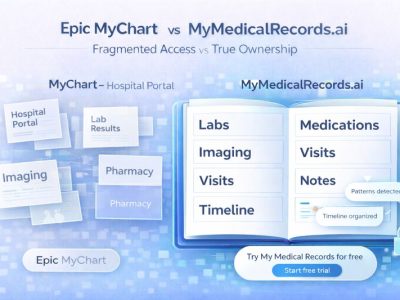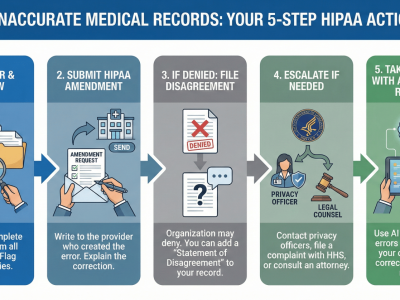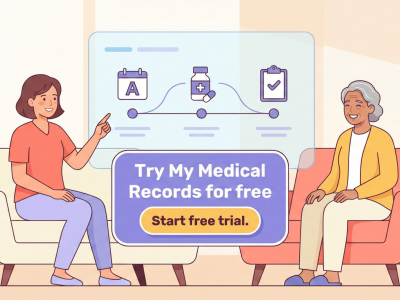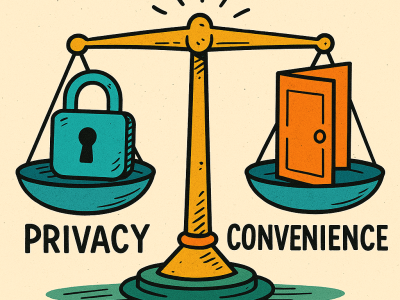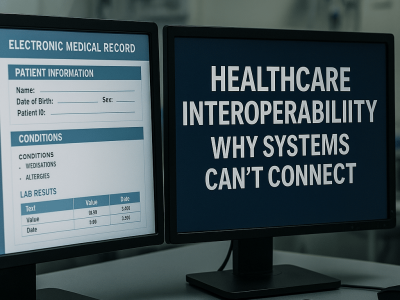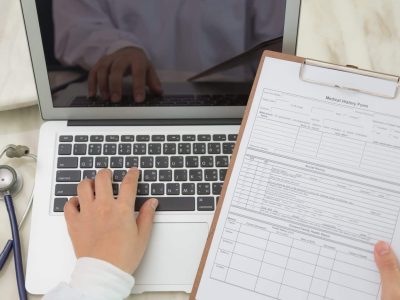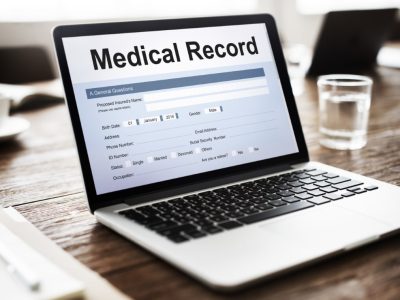Looking for the top medical records platforms that empower you with secure, easy-to-access healthcare data? This guide highlights five leading patient-centered platforms, comparing their features, security, and usability—so you can choose the best solution for your needs.
KEY TAKEAWAYS
A reliable medical records platform is vital for patient access, privacy, and control.
Evaluate platforms on security, ease-of-use, sharing features, and compliance.
AI-powered systems like My Medical Records simplify document management and retrieval.
Choose platforms that offer family access, mobile support, and seamless sharing.
Staying informed about your medical record number and retention timelines boosts data continuity.
Table of Contents

In an era where digital health is becoming the norm, having a dependable and secure medical records platform is more than a convenience—it’s essential. Whether it’s accessing critical data during emergencies, submitting insurance documentation, or sharing detailed histories with multiple providers, patients today need platforms that offer ease, reliability, and protection.
This blog dives into the top five platforms that stand out for patients who prioritize control over their own health data, with My Medical Records leading the way thanks to its advanced AI, encryption, and user-first design.

1. My Medical Records
My Medical Records is a HIPAA-compliant, AI-enhanced platform designed specifically for patients. It allows users to upload, categorize, and share documents seamlessly. Thanks to AI-based tagging and search, finding what you need is fast and intuitive. Its robust security includes encrypted storage, multi-factor authentication, and complete audit trails—ideal for insurance and legal purposes.
Family account support makes it easy to manage records for loved ones, while its mobile-friendly interface ensures your documents are accessible on the go. For individuals seeking centralized control, protection, and AI-powered organization, My Medical Records is unsurpassed. Learn about the importance of knowing your medical record number to maximize its benefits.
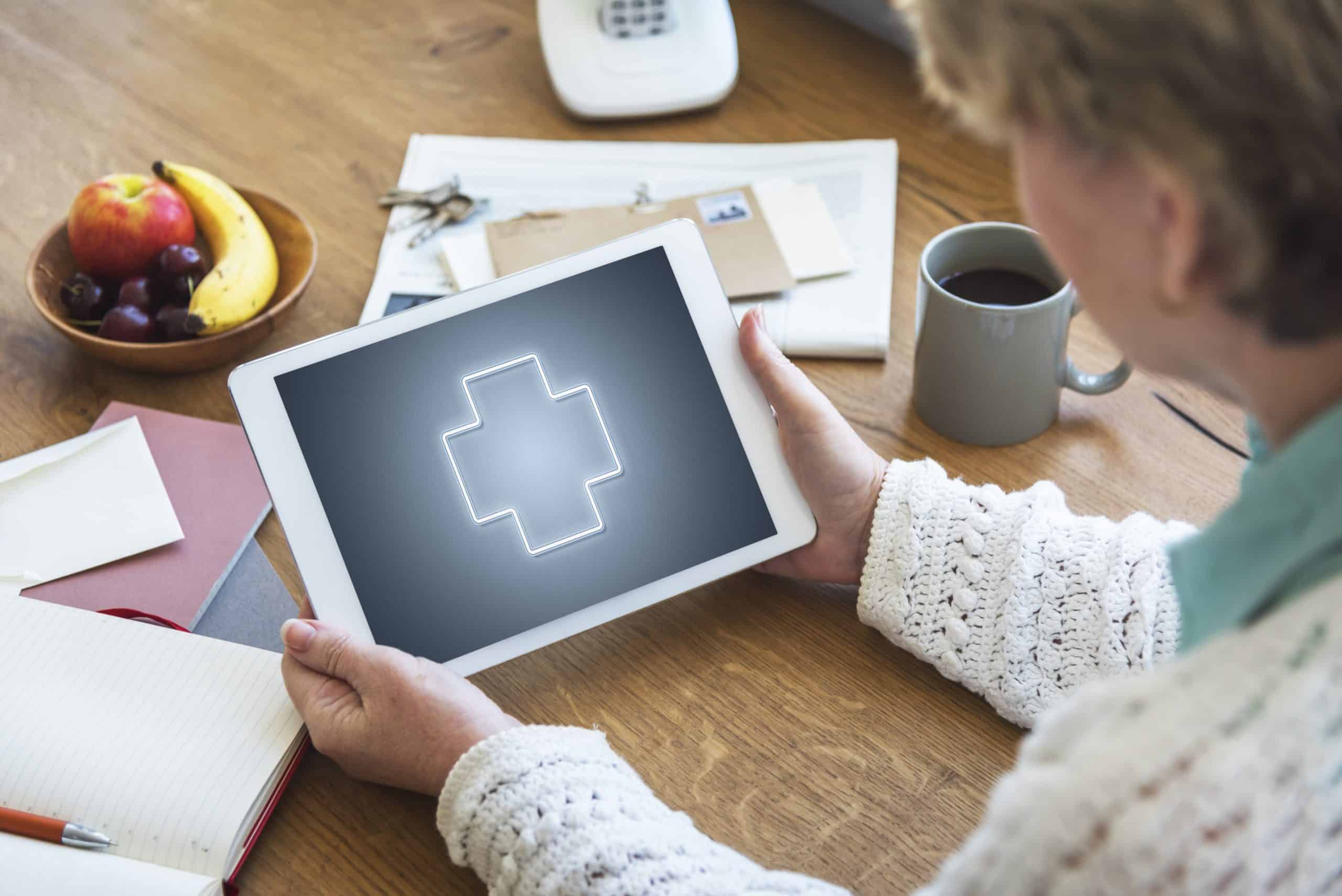
2. Personal Health Records (PHRs) from Healthcare Providers
Many EMR systems, such as MyChart and Epic, offer patient portals as Read-Only PHRs. These portals allow you to view lab results, visit summaries, and prescription histories. While these are convenient and often no-cost, they’re limited—you can’t upload external documents, and sharing is confined within the provider ecosystem.
These portals are useful for provider-specific access, but they lack the flexibility needed for cross-provider sharing and document control. For patients with care spread across multiple systems, platforms with document upload and sharing capabilities offer a more complete solution.

3. Apple Health Records & Google’s Patient Portal
Apple Health Records and Google’s patient features offer smartphone-based access to medical data by linking with participating hospitals and labs. They’re highly convenient, offer readable interfaces, and provide notifications for new results. However, they only sync with select providers and can’t handle externally uploaded documents or legal/insurance formatting requirements.
While good for tracking health, users needing complete, shareable medical dossiers should consider more comprehensive platforms designed for full documentation control.

4. Personal Cloud Storage Platforms
Platforms like Google Drive, Dropbox, and OneDrive are used by patients who want control over their medical document storage. They allow uploading scanned documents and PDF files, with the ability to share via secure links. Many users leverage these tools because of their familiarity and customization capabilities.
However, these platforms aren’t specifically designed for medical records. They lack HIPAA compliance unless you have business-level accounts with signed BAA agreements, and they don’t offer structured tagging, version control, or audit logs. Their general-purpose nature makes them a less secure and less user-friendly option for long-term medical data management.

5. Specialty Medical Record Apps (e.g., MyChart Guardian, Microsoft HealthVault alternatives)
Other niche apps offer patient record storage with shared access or caregiver features. Some provide document upload and emergency access features. While they excel in specific scenarios—like pediatric guardianship—they often have limited user interfaces and app connectivity.
Some startups offer secure medical file storage, but they may be under-supported or lack fully HIPAA-compliant frameworks. Unless they can guarantee encryption, terms of service, and AI-powered searchability, they’ll likely fall short for robust patient record management.
Comparing the Top Platforms
When weighing these five options, consider the following questions:
Can I upload and organize external documents?
Is the platform HIPAA-compliant with strong encryption?
Can I share easily with doctors, lawyers, or insurers?
Does it support multiple providers and family members?
Is it mobile-friendly and AI-assisted for fast retrieval?
My Medical Records meets all of these criteria and provides additional features like document expiry controls, legal-grade formatting, and audit history.
How to Choose a Medical Records Platform
Start by assessing your needs: Do you need emergency access? Are you managing legal or insurance cases? How many providers are you involved with? Once you know your priorities, evaluate platforms based on these criteria:
Security and compliance
Document management and upload options
AI or intelligent search
Family/caregiver access
Ease of sharing
Long-term data retention
If you’re still unsure, contact the My Medical Records team to demo their platform and see how it stacks up against other options.
Why AI Makes a Difference
Artificial intelligence automates tagging, organizes by date or provider, flags possible missing documents, and helps generate export-ready formats for claims or legal purposes. That makes a big difference over manual organization—no digging through digitized folders or misplaced PDFs.
Digital platforms without AI lack this layer of convenience. And when you’re managing complex documents—like psychiatric evaluations or operative reports—smart categorization saves you time and reduces error.
For more on your record’s life cycle, check out how long medical records need to be kept to align your storage habits accordingly.
Helpful Tips for Selecting a Medical Records Platform
Before settling on a platform, try uploading one month’s worth of documents to test usability. Look for features like AI search, family account access, secure sharing links, and confirm the platform’s About page for clear privacy and compliance policies.
Summary:
Choosing the right medical records platform is a key decision in managing your health data effectively. Whether your priority is provider access, legal readiness, or family management, the best tools combine security, user control, and intelligent features. My Medical Records leads with AI-driven organization, encrypted storage, and unmatched sharing capabilities—empowering both patients and professionals.
Related Topics:
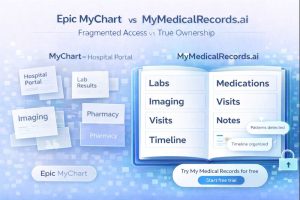
Epic MyChart vs. MyMedicalRecords.ai: Portal Access vs. True Ownership
Epic MyChart vs. MyMedicalRecords.ai: Portal Access vs. True Ownership Meta description: Epic MyChart only shows records from one hospital system. MyMedicalRecords.ai aggregates 100% of your
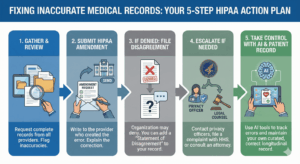
What to Do If There Is Inaccurate Data in Your Medical Record
The chart that does not match you You probably discovered the inaccurate medical records error because something routine went wrong: a prior authorization denied, a
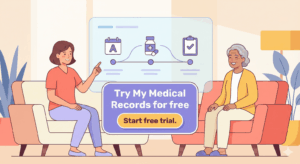
From Chaos to Clarity: A Family Caregiver’s Guide to Unified Health Records
Here’s what nobody tells you about caregiving: The hardest part isn’t watching your loved one struggle with their diagnosis. It’s trying to keep track of
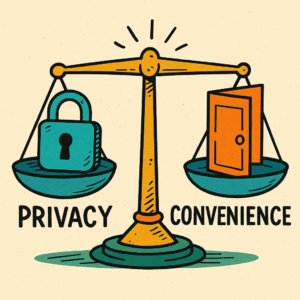
Privacy vs Access: Finding the Right Balance in Your Digital Health Record
Healthcare interoperability is the ability of different healthcare systems, devices, and applications to seamlessly share, understand, and use patient data across organizations and geographic boundaries.
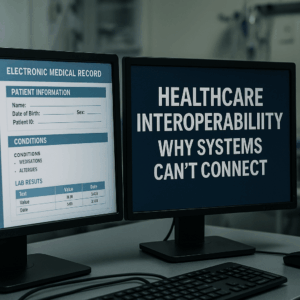
Healthcare Interoperability: Why Systems Can’t Connect
Healthcare interoperability is the ability of different healthcare systems, devices, and applications to seamlessly share, understand, and use patient data across organizations and geographic boundaries.

How to Merge Medical Records from Multiple Doctors and Avoid Errors & Duplicates
Learn how to merge medical records from multiple doctors, avoid duplicate entries, and reduce errors. Use AI tools like My Medical Records to simplify the process.

